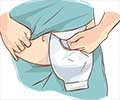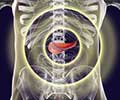Therapies which have demonstrated clear benefit
Serotonin Reuptake Inhibitors: Fluoxetine has been demonstrated in a variety of studies to be an effective treatment for PMS when given in a daily dose of 20 mg/day. The overall response rate is 60 to 75%. The beneficial response is maintained for many years. The most common reasons for failure to continue the treatment are headache, anxiety, and nausea. Other drugs that inhibit serotonin reuptake, such as clomipramine (given either throughout the menstrual cycle or restricted to the luteal phase), sertraline (50 to 150 mg/day throughout the menstrual cycle), and nefazodone are also effective.
Alprazolam: The benzodiazepine alprazolam (0.25 mg TID OR QID) has been shown in double-blind, placebo-controlled crossover studies to be beneficial in PMS. However, the initial enthusiasm for this drug, has waned as it seems to have little benefit with regards to the non depressive symptoms of PMS. In addition, addictive potential if not used only in the luteal phase has relegated alprazolam to second line therapy.
GnRH agonists (Leuprolide) :Pulsatile secretion of GnRH normally stimulates the release of gonadotropins (follicle-stimulating hormone and luteinizing hormone). In contrast, when GnRH or its agonists are given continuously, gonadotropin secretion and gonadal function are suppressed. Prohibitive cost and need for parenteral use relegate leuporlide to use in patients refractory to SSRI agents
Danazol: is a 19-nortestosterone derivative with progestin-like effects. It inhibits pituitary gonadotropin secretion, and when given in sufficient doses inhibits ovulation, is an effective therapy for PMS However, the androgenic side effects of danazol limit its use to patients who fail to respond adequately to the above therapies.
Therapies with possible benefit
Oral contraceptives: Although the theoretical advantage to use of OCPs is supported by anecdotal reports that PMS symptoms resolve during pregnancy, controlled trials of the use of oral contraceptive agents in the treatment of PMS have been disappointing.
Diuretics: While commonly used, studies using diuretics in premenstrual syndrome have failed to show reproducible beneficial effects.
Therapies shown to have no benefit
Progesterone : Progesterone, which once constituted the most common therapy for PMS, has now been shown to be ineffective in various studies.
Antidepressants and Lithium: Based upon current evidence, there is no rationale for use of these agents in PMS.
Diet and vitamin supplements: A variety of dietary and vitamin supplements have been tried in the treatment of PMS and have found to be no better than placebo. These include evening primrose oil, essential free fatty acids, ginkgo bilboa extract and vitamin B6. Their use in the treatment of PMS cannot be advocated.
In women with socioeconomic dysfunction SSRIs are drugs of choice.
Alprazolam, GnRH agonists are second line agents.
Progesterone, antidepressants and vitamins have no benefit.
Therapeutic approach
Treatment should not be considered unless a clear diagnosis of PMS has been established. In particular, women must be symptom-free during the follicular phase. In the absence of clear criteria for socioeconomic dysfunction, the patient should be advised to consider exercise and relaxation techniques.
Pharmacologic intervention should be considered if these therapies do not provide relief.Women who meet the criteria for PMS including socioeconomic dysfunction are best served by immediate pharmacologic intervention. Because of the proven efficacy and safety profile, serotonin reuptake inhibitors (SSRIs) are the first line therapy.
Fluoxetine has been the best studied. The effective dose is 20 mg/day. Approximately 15 percent of patients will experience significant side effects from an SSRI, including nausea, jitteryness, and headache. In such patients, a trial of either a lower starting dose or a second SSRI is warranted. An additional 15 percent do not respond to an SSRI over several menstrual cycles. Resistance should not be diagnosed because of lack of response during the first menstrual cycle after therapy has been instituted. There is no convincing evidence that increasing the fluoxetine dose beyond 20 mg/day (or its equivalent) will improve response rate. Such women are candidates for alprazolam treatment provided they are reliable and will restrict use to a dose of 0.25 mg TID or QID in the luteal phase of the cycle.
Patients who do not respond to SSRIs or alprazolam are candidates for ovulation suppression agents. A GnRH agonist is preferable to danazol because of the more favorable side effect profile. These must preferably be done with expert help and consultation




